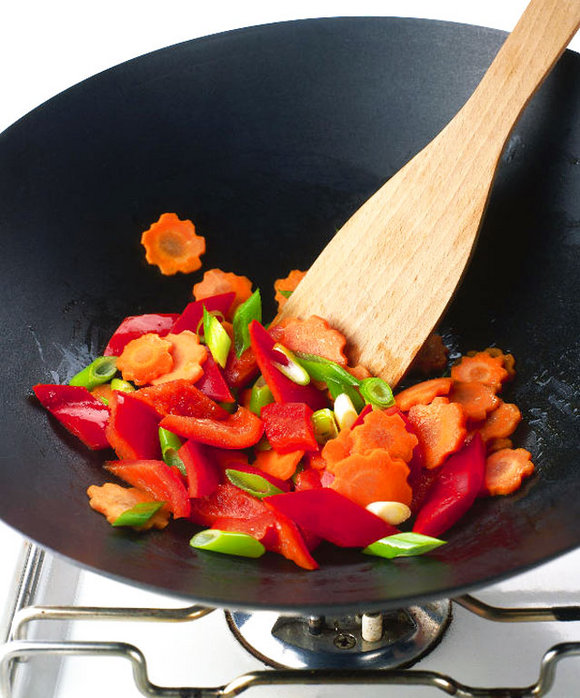
Stainless steel cookware
An alternative is aluminum or steel coated with porcelain-enamel. As long as the coating remains in good condition, the surface of these pots is durable, with no metal leaching into the food. Good quality cookware will have an extremely hard finish that is fused to the metal and won’t scratch, rust, fade or peel. However, some lower-priced cookware, which resembles porcelain-enamel, has an easily-damaged baked enamel finish.
Ironware may be a good choice for some cooks, although cast iron is heavy and takes a great deal of care to prevent rusting. Cast iron cookware releases some iron into food – one of the few instances where metal leaching into food from cooking utensils is considered desirable. Although the iron is not easily absorbed by the body, it interacts with foods and provides some beneficial dietary iron. Iron saves energy, since it retains heat after the element is turned off.
Many health-conscious people swear by stainless steel cookware. But while stainless steel is relatively inert compared to other metals, the metals present in the alloy can be released into food in extremely low quantities. These metals can include nickel, molybdenum, titanium, aluminum and carbon steel.
Some people keep their pet birds in the kitchen. It’s a natural gathering place for family, friends and pets. But bird owners should be aware that there are potential dangers in the kitchen, too. Cooking fumes, smoke and odors that have little or no effect on people can seriously sicken and even kill some pet birds, often quite quickly. Dr. Karen Rosenthal, DVM offers tips to keep pet birds safe.
Learn More about Teflon
1. Always keep your pet bird out of the kitchen while cooking.
Many veterinarians urge pet owners to keep their birds in a room other than the kitchen. But if the kitchen is your bird?s favorite place, always move it to another room before cooking.
2. Never leave heated cookware unattended.
Sadly, bird fatalities can result when both birds and cooking pots or pans are left unattended in the kitchen ? even for just a few minutes. Cooking fumes from any type of unattended or overheated cookware, not just non-stick, can damage a bird’s lungs with alarming speed. This is why you should always move your birds out of the kitchen before cooking.
3. Never preheat your cookware on high heat.
If accidentally overheated, non-stick cookware can emit fumes that may be harmful to birds, as can any type of cookware preheated with cooking oil, fats, margarine and butter. This is why you should always move your birds out of the kitchen before cooking.
4. Always turn on the exhaust fan or open a window before cooking.
It’s important to make sure that your kitchen is properly ventilated. In addition to cooking fumes, birds are highly sensitive to a variety of other fumes such as: aerosol sprays, non-stick sprays, perfumes, any source of smoke, pesticide sprays, glue, paints, self-cleaning ovens and cooking gas.

Question or Comment? Enter it below.